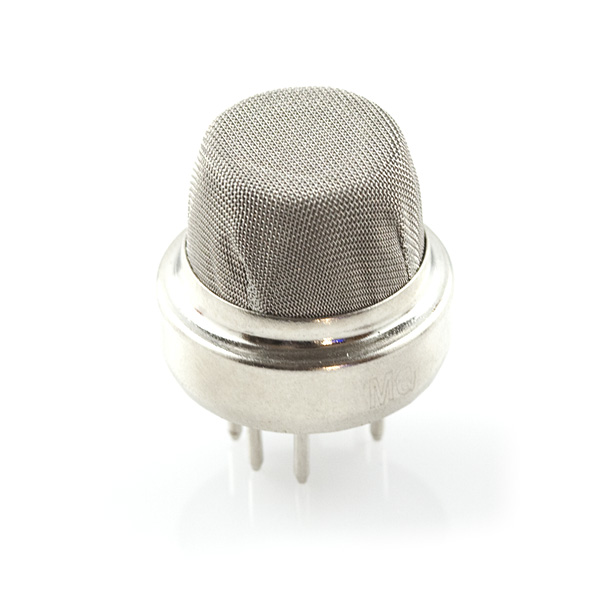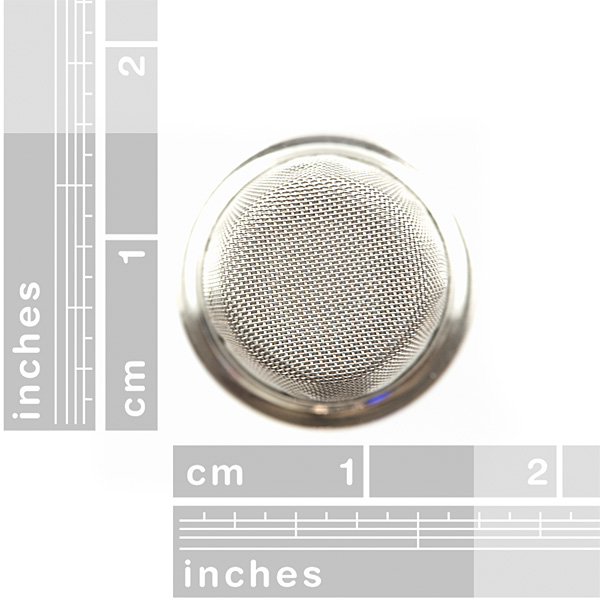This is a simple-to-use liquefied petroleum gas (LPG) sensor, suitable for sensing LPG (composed of mostly propane and butane) concentrations in the air. The MQ-6 can detect gas concentrations anywhere from 200 to 10000ppm.
This sensor has a high sensitivity and fast response time. The sensor's output is an analog resistance. The drive circuit is very simple; all you need to do is power the heater coil with 5V, add a load resistance, and connect the output to an ADC.
This sensor comes in a package similar to our MQ-3 alcohol sensor, and can be used with the breakout board below.
LPG Gas Sensor - MQ-6 Product Help and Resources
Hazardous Gas Monitor
June 17, 2016
Build a portable gas monitor to check for dangerous levels of hazardous gases.
Pinouts
Checking with a multimeter and it does not matter if it's A or B on any of the gas sensors that is connected with the breakout board. If you look at the datasheet, it shows that the pins for A1 and A2 or B1 and B2 are internally connected together, respectively. Also the application circuit shows that the polarity does not matter, just as long as the pins on each side align with the breakout board.
Core Skill: Soldering
This skill defines how difficult the soldering is on a particular product. It might be a couple simple solder joints, or require special reflow tools.
Skill Level: Noob - Some basic soldering is required, but it is limited to a just a few pins, basic through-hole soldering, and couple (if any) polarized components. A basic soldering iron is all you should need.
See all skill levels
Core Skill: Electrical Prototyping
If it requires power, you need to know how much, what all the pins do, and how to hook it up. You may need to reference datasheets, schematics, and know the ins and outs of electronics.
Skill Level: Noob - You don't need to reference a datasheet, but you will need to know basic power requirements.
See all skill levels
Comments
Looking for answers to technical questions?
We welcome your comments and suggestions below. However, if you are looking for solutions to technical questions please see our Technical Assistance page.
Customer Reviews
4 out of 5
Based on 1 ratings:
Initial test OK
Haven't implemented in final design yet.



why I measure the resistance on the board is around 18K ohms, but the datasheet said it's 4.7 K ohms thanks
I am confused with datasheet 2.2. it said "if lighter gas sprays the sensor , it will cause extremely damage." what do you mean by " lighter gas"? isn't it for measure the gas level?
Use the SF Gas Sensor Breakout Board. The MQ-6 label should be oriented as shown in the picture of the breakout board board (to the left when looking at the bottom of the breakout board). Connect (GND TO Ground), (A1 TO +5V), (H1 TO +5V; heater) and [B1 TO (10kohm load resistor to ground) AND B1 TO (Analog pin)]. In effect you measure the difference between A1 and B1.
Got this sensor working nicely and some results graphed showing its highly sensitive response to propane. More in my blog.
could you please tell me the working principle of MQ6?
so is there a way to get this sensor to detect a higher ppm. i need a sensor to tell me when propane gets to 42000 ppm also can this detect Mapp/pro gas
Does anyone know if this can detect gasoline fumes as well? Or is there another sensor on sparkfun that can?
Type GAS in the website search box... Absolutely there are 5 awesome gas sensors!
I've searched GAS in the search box, and I can't find one that identifies gasoline (or diesel) within the specs for any sensor...
please help me,in which terminals of MQ-6 gas sensor we have to connect Vcc,output,ground?
@zv470 so we can connect any pin 2 5v
Would it work if I had a fan sucking in air (at a very low flow rate) to an enclosure with this inside? Or does this need to be exposed directly outside of an enclosure?
If it is in the inside of the device, does the device emit any kind of gases or temperatures that may interfere with its operation. I suggest being catious and either leaving it all or mostly external to the device or at least partitioning the gas sensing area from the rest of the device.
Friends,
I have few doubts regarding this sensor.
I would like to know,
1. the distance within which the sensor can detect the gas.
ie., the distance b/w gas source and sensor
2. Average lifetime of the sensor
these details are not provided in the datasheet.
can anyone provide me the answer.
The distance measured is probably 0 units of measurement from the interior of the sensor! It does not use radiated or reflected spectral analysis. The wind screen is a good indicator that it needs gases to calmly waft by its "nose" to give accurate and steady measurements. This is all just intuited but I would also say that the fact that the pins are designed like transitor tubes of old, they have limited lifetimes and are meant to be easily replaced.
The distance it can detect the gas at is not easy to determine, it has a range of 200 to 10000ppm. It depends of a few variables, I.E. Gas source, leakage rate, room size, air currents, and sensor placement, not the sensor itself as the gas has to accumulate to above 200ppm and physically reach the sensor.
As for the lifetime I do not know.
Has anybody an Arduino example code for the GAS SENSOR MQ-6, taking into account the dependence on temperature and humidity.
does anyone ever try this sensor ?
I've bought one,n i try it once but it doesn't work yet ?
I suspect the problem from "preheat 48 hour " ..
does it mean I have to heat that sensor for 48 hour and never plug out the power for every I use ? or preheat ,it just only for first usage only n for the second one it doesn't need to be heated 48 hours ??
thank you
@Sency hi, it doesn't matter which way as u can hookup A to B or B to A, :) Have a look at the datasheet. ;)
Thanks for the response. If so it's no prob. :)
Does anybody know how to identify the PIN Number 1? (or lets say PIN A1). Both side of the module looking same. I'm confused. :)
-KUSHAN-